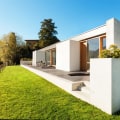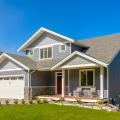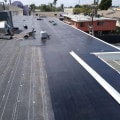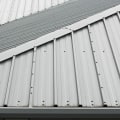Homeowners must consider both design and practicalities when deciding between a sloped roof or a flat roof. In general, however, flat roofs are more appropriate for areas that receive little rainfall, and sloped roofs are more suitable for wetter climates due to their ability to withstand moisture damage. Some homeowners choose flat roofs because Energy Star considers them to be more energy efficient. The Department of Energy classifies flat roofs as cold roofs, which are the roofs with the highest potential for reflective surface area.
Flat roofs are also friendlier to solar panels because the panels can be positioned so that they receive more direct sunlight than sloped roofs. While sloped roofs are more cost-effective and last longer than flat roofs, flat roofs work very well with solar panels because the panels can be placed in such a way that they receive more direct sunlight than with a sloped roof. Flat roofs also lend themselves better to placing air conditioners and other large appliances needed for your business. Storing appliances on the roof instead of inside the building will make the interior of the building quieter and can also free up space for other equipment or storage you need.
Depending on the type of materials and the quality of the installation, a flat roof can last from a limited lifespan of 10 years to about 15 years. On the other hand, sloped roofs with quality asphalt shingles installed correctly can last longer, between 15 and 20 years. Both flat and pitched roofs need regular maintenance. Flat roofs will have to be repaired at some point, as water will inevitably accumulate and create weak spots.
Sloped roof maintenance includes replacing detached shingles, resealing and fixing nails. However, this tends to be less costly than maintaining flat roofs. No matter what type of roof you have, the right roofing contractor makes all the difference. If you need maintenance or repairs to your roof, do your research to ensure that the roofing company has a strong track record with your roof type and is equipped to perform minor repairs and replacements.
Flat roofs don't last as long as sloped roofs. It's a simple matter of physics. While water and debris can fall directly from a sloped roof, they accumulate on a flat one. This adds a lot of stress to the lifespan of the roof and means that flat roofs can last decades less than their sloped counterparts.
In terms of longevity and maintenance, pitched roofs generally last longer than flat roofs and require less maintenance, thanks to their ability to minimize leaks. However, a flat roof solar panel system can be oriented to face any angle, no matter what direction you look at the property. On the other hand, flat roofs are more sensitive to people moving over them, so if you plan to hang out on the roof, you can create a lot of noise for anyone inside your house. Reliable Roofing is not only a member of the National Association of Roofing Contractors, but it is licensed, warranted, and insured to provide customers with maximum peace of mind.
Even if you don't choose to make your flat roof “green”, you can use the space as a patio area, depending on the materials it's built from. Because sloped roofs don't collect water as easily as flat roofs, they generally require less maintenance over their lifespan. However, the maintenance of a flat roof will increase over the life of the home, which you should consider when calculating your expenses. Building codes may dictate the final location of the air conditioner and heating system, but the flat roof offers the most space available.
With their clean lines and minimalist appearance, flat roofs are often used in more contemporary-looking homes. While sloped roofs still need to be inspected regularly, they tend to have fewer structural problems than flat roofs. Although you don't notice it, flat roofs are actually designed with a slight, almost undetectable slope that will carry water into the gutters. When homeowners commit to a roof replacement project, one of the most important decisions they must make is choosing the roof material.
If you're looking for a robust and cost-effective roof for your building, a pitched roof is most likely the best option. Gravity works with the roof rather than against it, so the roof experiences less stress over its lifespan. When it comes down to it, there are pros and cons associated with both flat and sloped roofs; it's up to homeowners to weigh these factors against each other in order to make an informed decision about which type of roof is best for their home.



